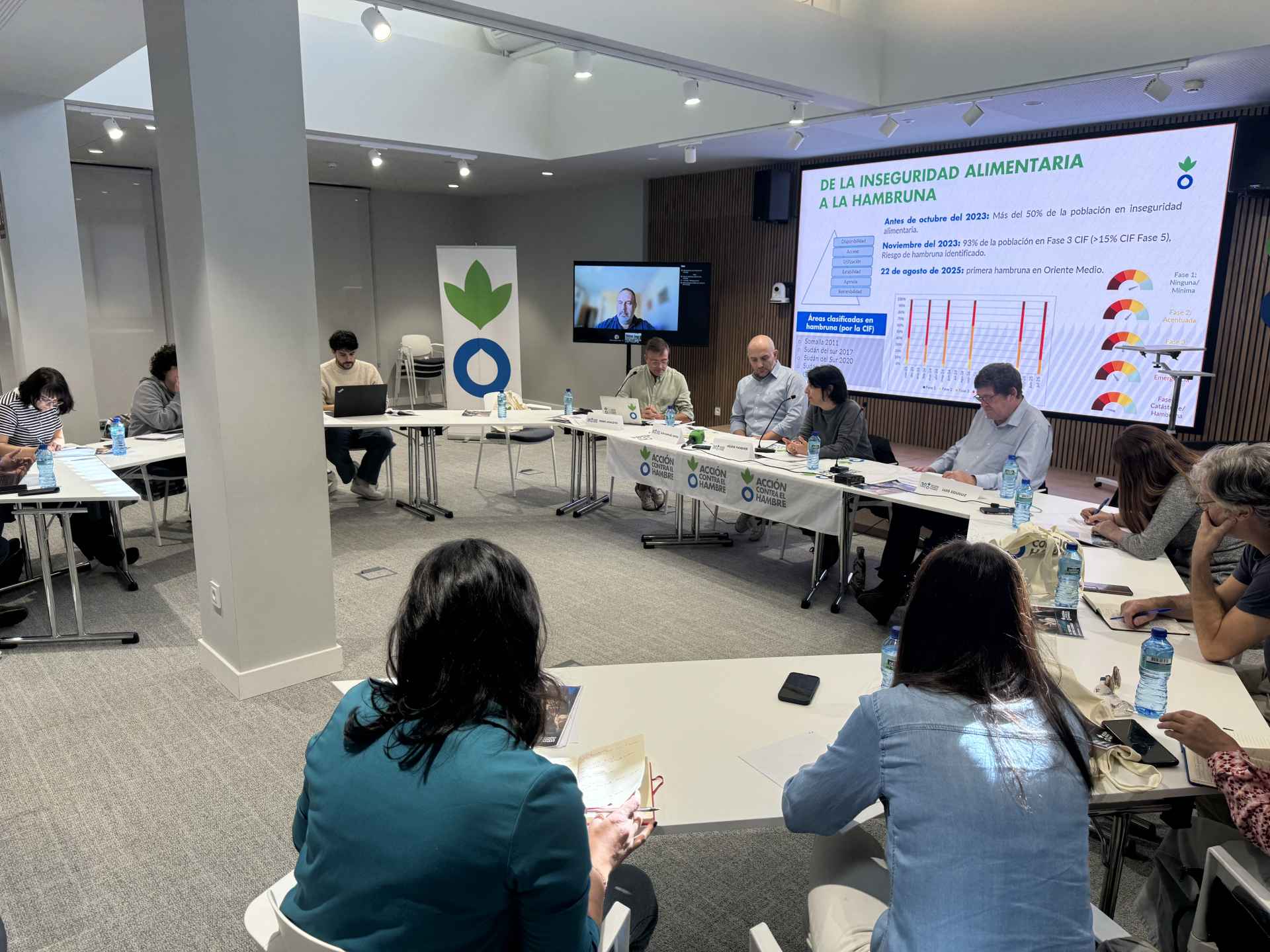

Action Against Hunger warns of 700% increase in child malnutrition in Gaza as of October 2023
TWO YEARS OF HUNGER IN THE OCCUPIED PALESTINIAN TERRITORY
Before October 2023, the organisation was not required to implement nutrition activities in the Strip.
"I saw a 7-year-old boy who weighed only 6.5 kilos. Prevention is key to prevent children on the brink of starvation from falling into hunger.” Vicent Stehli, operations director, who just back from Gaza
Madrid, 6 October 2025. Action Against Hunger today presented an analysis in Madrid on the impact of two years of displacement, violence, and conflict on hunger in the occupied Palestinian territory.
Gaza: famine, displacement and collapse of the humanitarian space
Since August, Gaza has officially been in phase 5 (famine) of the Integrated Phase Classification (IPC), and in July, Action Against Hunger teams documented a 700% increase in cases of child malnutrition since October 2023. Action Against Hunger's director of operations, Vincent Stehli, who has just returned from Gaza, has clarified that in September alone, "our teams treated between 300 and 400 children under the age of five, when just a few months ago the number of cases was barely 100".
Action Against Hunger's head of food security and livelihoods, Hélène Pasquier, explained that before October 2023, the organisation did not implement nutrition activities. The expert also described what malnutrition means for a child's body and mind: "First, the child begins to reject food even though their body is hungry. We begin to see the first symptoms of apathy: they don't want to play, interact or smile. The brain reduces energy expenditure: learning and social relationships are no longer an option. When the child reaches the stage of severe acute malnutrition, they disconnect from their surroundings, do not respond to any stimuli and are in survival mode. Breathing, beating the heart and maintaining body temperature are the only things the body focuses on. When the body runs out of reserves, if there is no treatment, it dies."
Vincent Stehli added that, during his recent work in Gaza, he witnessed the malnutrition described by Hélène: "I saw a 7-year-old child who weighed only 6.5 kilograms. Prevention is key to breaking trends and preventing children on the brink of famine from falling into it."
The security of our teams in Gaza
"At Action Against Hunger, we have a team that works 24 hours a day to help, following forced displacement orders, with 30 to 60 movements a day... The population lives with displacement upon displacement, building tents out of plastic or rubbish, whatever they have at hand. They live in a state of tension due to these movements," emphasises Action Against Hunger's global security referent, Luis Eguiluz.
"To minimise risks, we have teams trained in security that we support from headquarters, we plan movements very carefully, we coordinate so that they do not pass through dangerous areas, we have maps and communications that allow us to guide them to avoid the most dangerous areas. We also coordinate with the United Nations and other organisations, but even so, our teams are at risk because it is impossible not to take risks," adds Eguiluz.
The use of hunger as a weapon of war
Jean-Raphaël Poitou, Action Against Hunger's Middle East advocacy manager, stressed that "using hunger as a weapon of war is a violation of international law and contrary to United Nations Security Council Resolution 2417." Extreme Israeli restrictions on access to essential goods, the destruction of agricultural infrastructure, the blocking of humanitarian corridors and the militarisation of distribution points have caused an unprecedented food crisis in Gaza.
Jean-Raphaël Poitou recalled that, in the face of constant forced displacement orders, "there are people in Gaza who do not have the funds to move. Renting a car can cost up to $3,000. Our colleagues who lived in Gaza City may never return to their homes. But despite everything, Action Against Hunger was one of the only INGOs still working in Gaza City, but we also were forced to halt our operations."
"There are no longer any so-called safe areas in Gaza," added Jean-Raphaël Poitou. “Our colleagues Mohamed, Obada and Mustafa were killed in safe areas. I have no words to describe what is happening. It is hell on earth. We need a permanent ceasefire now as the only way for humanitarian aid to enter in the necessary quantities and safety," he demanded.
Our operations in the West Bank
The crisis in the West Bank also reflects tactics that create food insecurity. 600,000 people were already vulnerable to food insecurity at the end of 2023 due to Israeli settler and military violence and disruption of supply chains. As the numbers rise, a third of the Palestinian population in the West Bank has lost their jobs and the price of basic foodstuffs has risen by up to 15% in the last month.
"In some Palestinian villages, barriers have been put in place that prevent even humanitarian personnel from entering," said Jean-Raphaël Poitou. "Military incursions and increased settler violence have destroyed crops, blocked access to agricultural land and paralysed local markets," he added.
Action Against Hunger has reiterated its call for an immediate and permanent ceasefire, the unconditional release of all hostages, respect for the United Nations aid coordination mechanism, free and large-scale access, and respect for international humanitarian law, including the protection of civilians and humanitarian personnel.
Since October 2023, Action Against Hunger has supported 1.5 million people across the occupied Palestinian territory through the distribution of food, drinking water, hygiene products, sanitation services, cash assistance, screening and treatment of malnutrition in children, the installation of mother and child spaces, and agricultural interventions.
